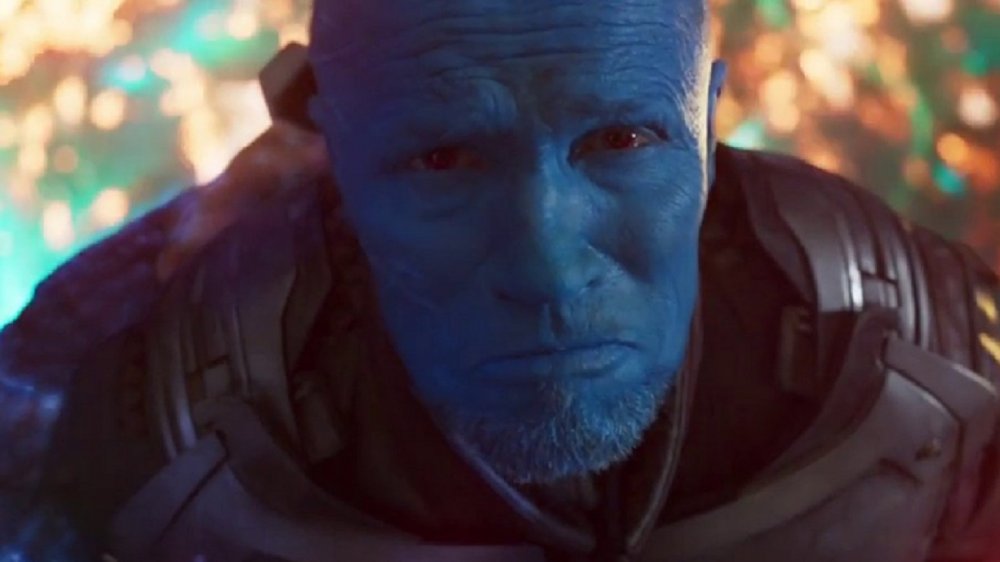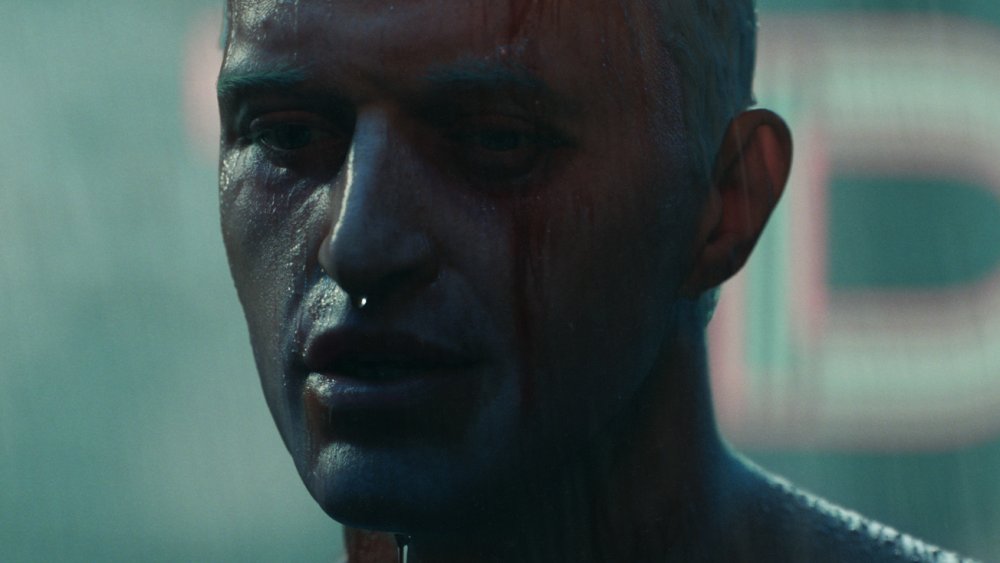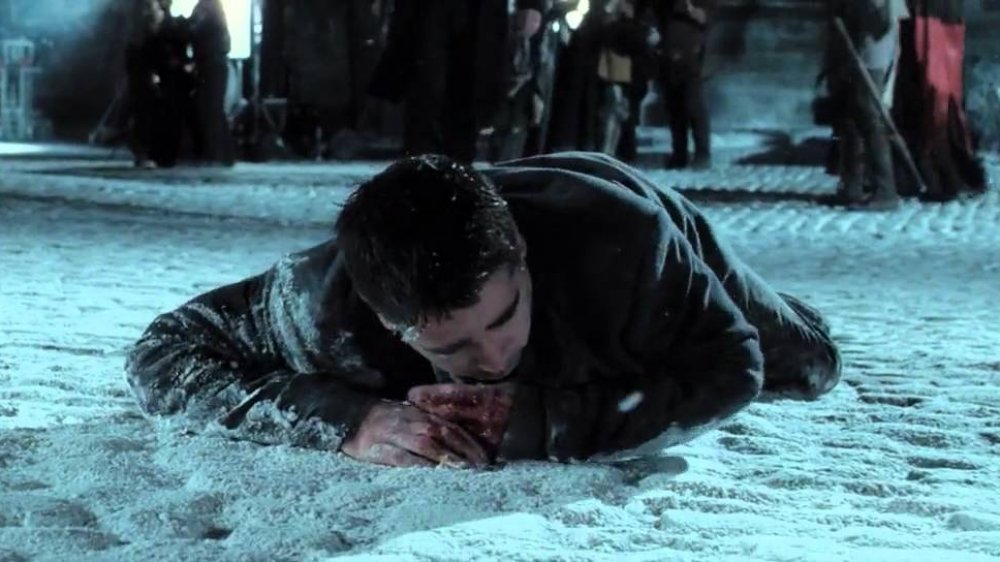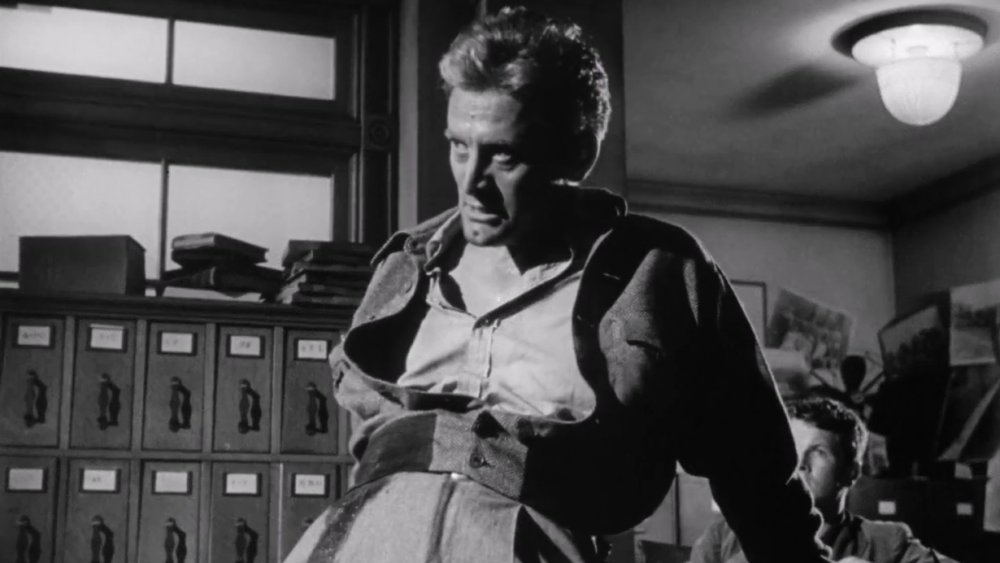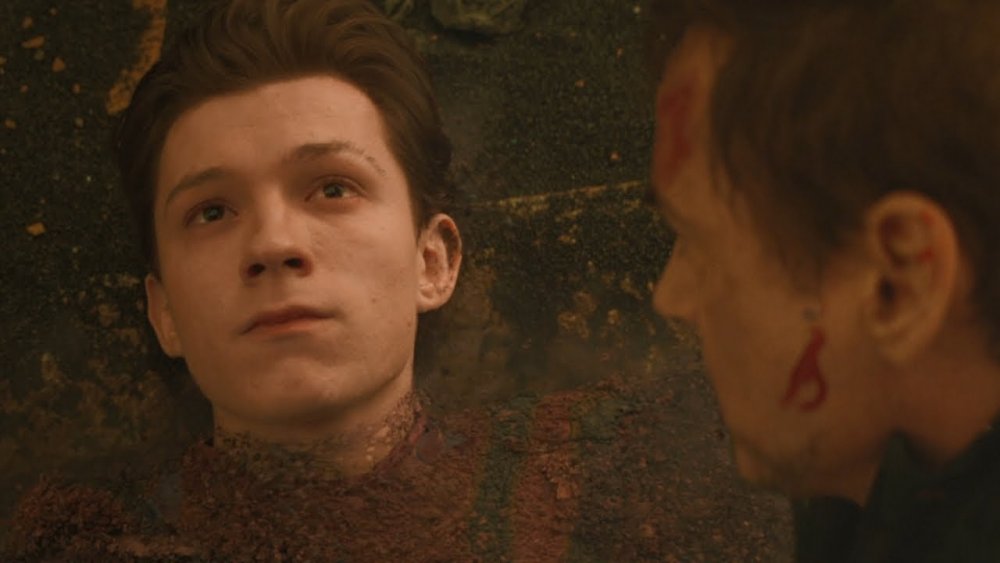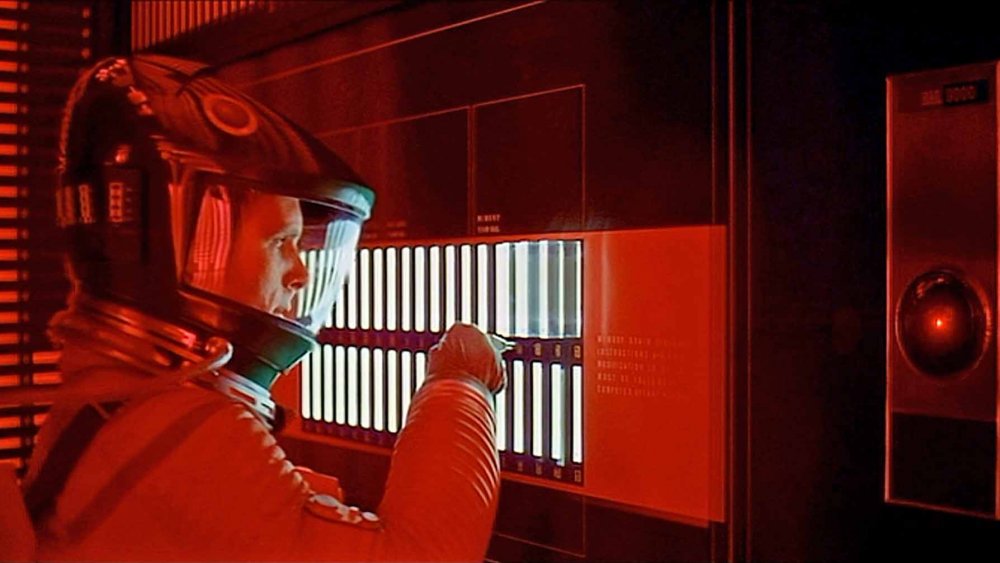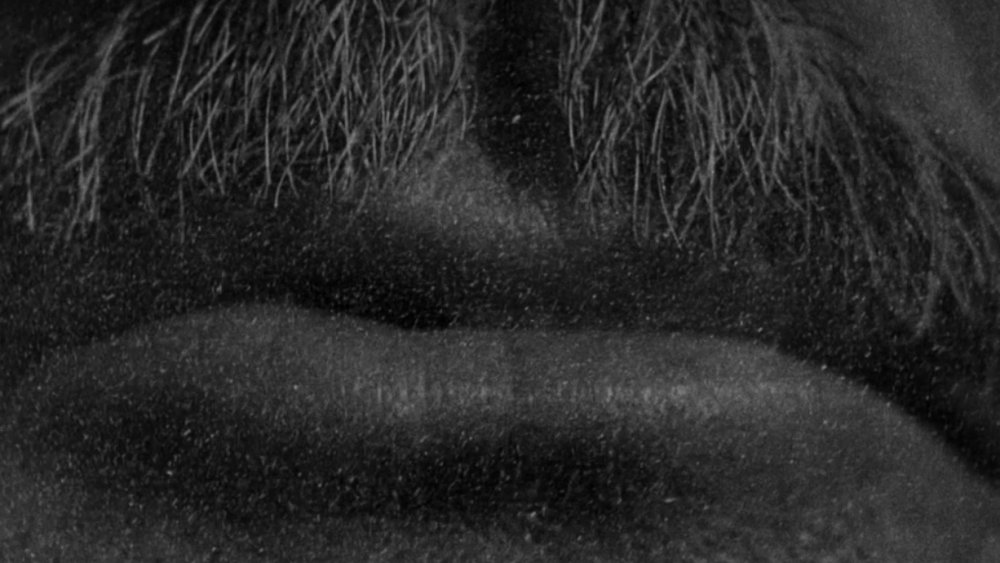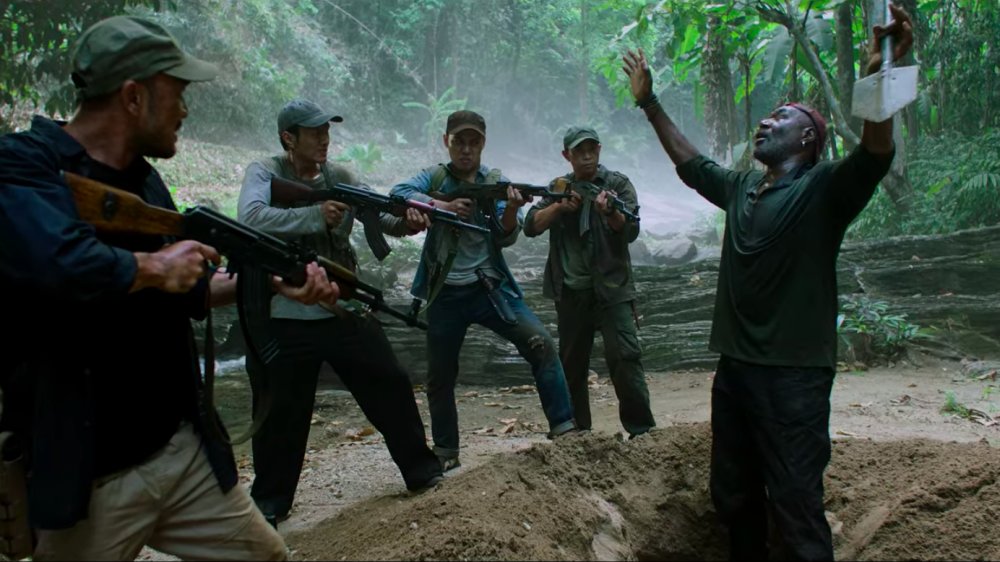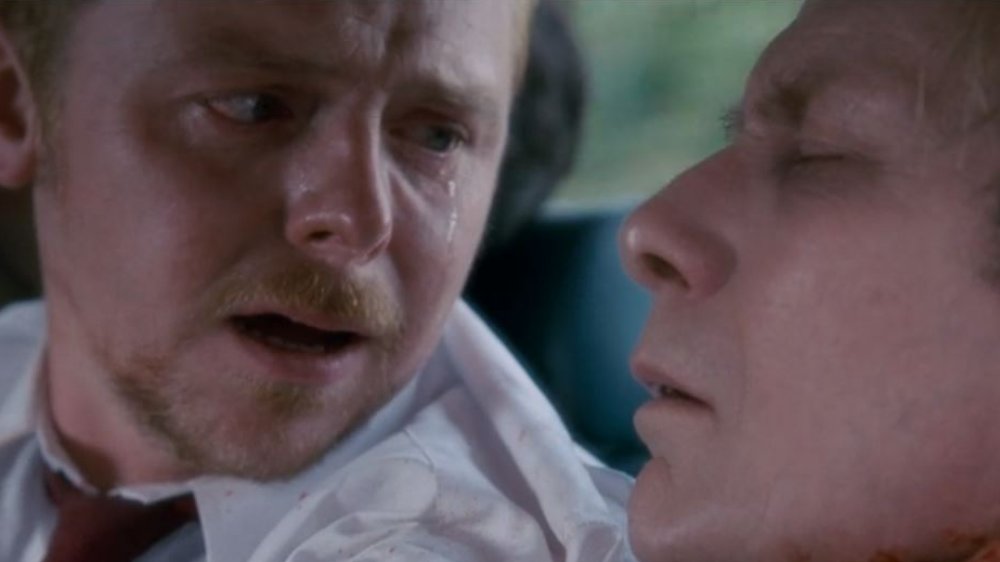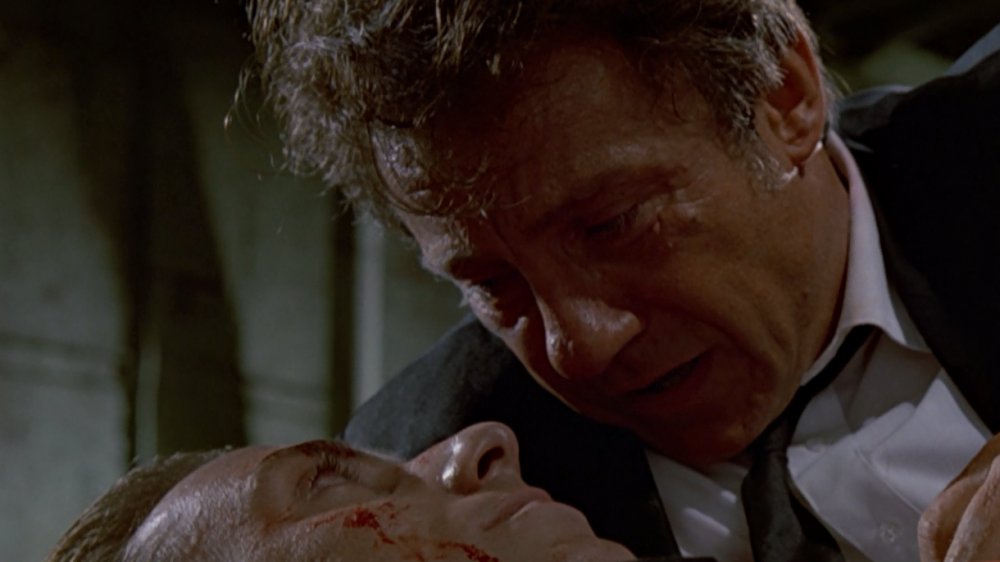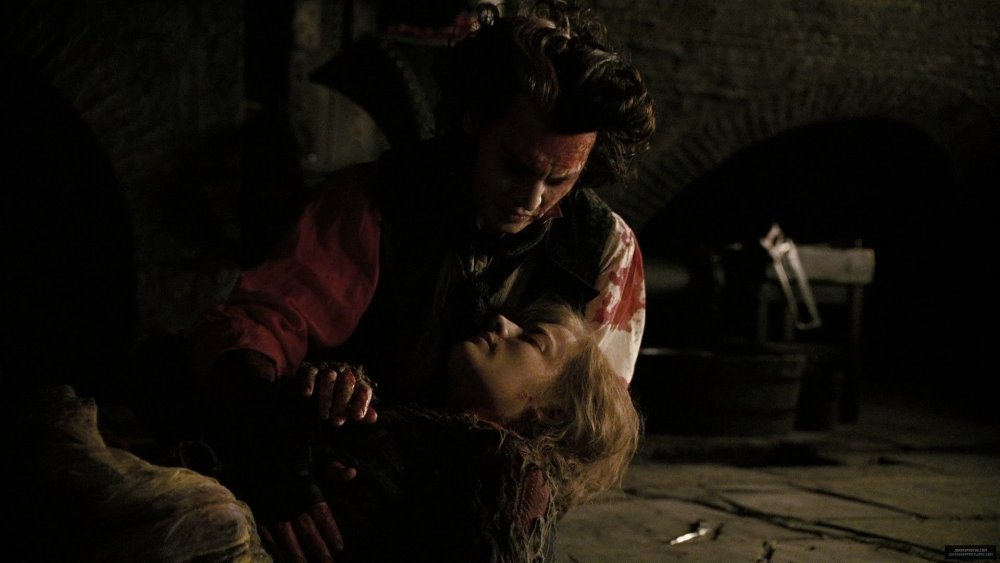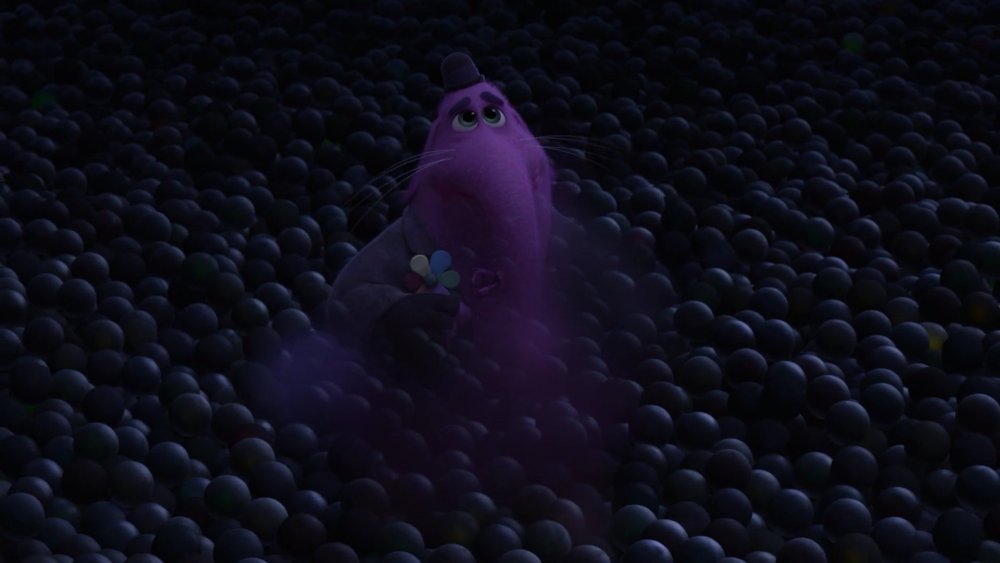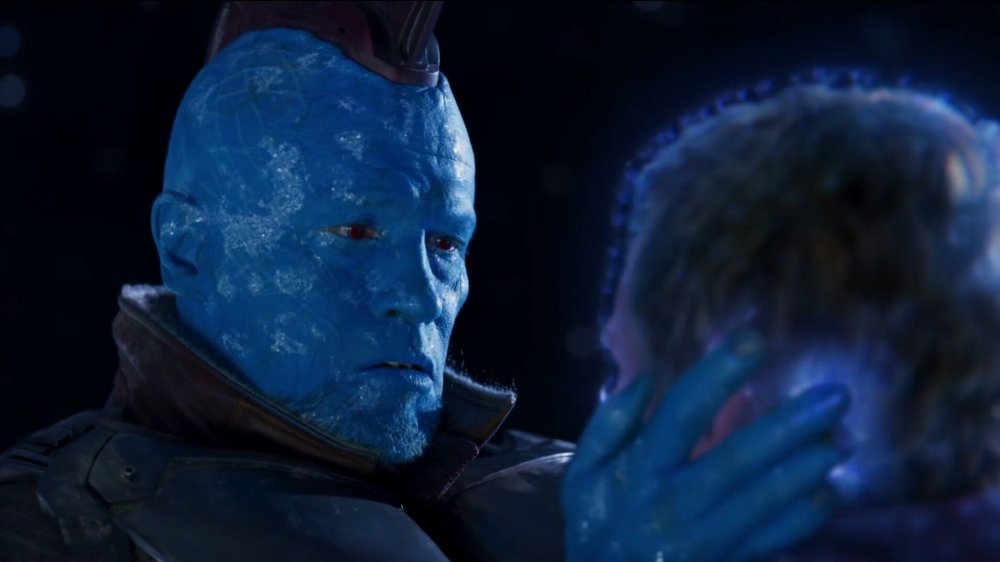The Saddest Last Lines In Movie History
Karl Marx's last words were allegedly, "Last words are for fools who haven't said enough." Most screenwriters would disagree. At their best, movies can get us so invested in their characters that it's like they live an entire life in their couple hours on screen, and writers will do everything they can to invest those moments with meaning, right up to the end.
Movie characters can use their last words to beg for more time, to make a last confession of their secret loves and crimes, or to reflect on their lives. And most of all, these characters can use their last lines to make us cry. From Victorian London to the distant future, from New Mexico to the depths of space, here are the saddest last lines in movie history. (Some of these deaths are unexpected, so major spoilers for everyone who hasn't yet had the privilege of seeing any of these movies.)
Roy Batty goes out poetically in Blade Runner
In the sci-fi classic Blade Runner, Harrison Ford plays Deckard, a cop who "retires" robotic workers called replicants when they escape their masters and hide within the human population. But as he pursues his targets, he makes some disconcerting discoveries. If replicants really are "more human than human," does that make him a murderer? Is he himself a replicant?
The escaped replicants, led by Roy Batty (Rutger Hauer), desperately want to extend their built-in four-year lifespan, which leads to a final showdown between Batty and Deckard. Director Ridley Scott channels his earlier sci-fi classic Alien as Roy hunts Deckard through a massive hotel, giving him a taste of the fear every replicant lives in every moment. Then, when Deckard is at his mercy, Roy saves him.
These are the last moments of Roy's four years, and he leaves a parting message as he goes, saying, "I've seen things you people wouldn't believe. Attack ships on fire off the shoulder of Orion. I watched C-beams glitter in the dark near the Tannhäuser Gate. All those moments will be lost in time, like tears in rain. Time to die."
It's a beautiful reflection on the tragedy of his death ... and all death. In his short life, Roy got to experience the wonders and beauty of the universe. If he'd been allowed to live, he might've told his story. But instead, all these images die with him.
Ray reckons with his guilt in In Bruges
In Bruges tells the story of two hitmen, Ray (Colin Farrell) and Ken (Brendan Gleeson), on a mission in the titular Belgian town. It turns out that their target is Ray himself. Their boss, Harry (Ralph Fiennes), wants him dead for accidentally killing a child and sent them to Bruges so Ray could enjoy his final moments. (Ray, ironically, absolutely hates it.)
When Ken refuses to kill Ray, Harry arrives to do the job himself. We watch from Ray's perspective as he's being carted off on a stretcher after taking three shots in the back, and he reflects on the guilt that's haunted him all through the movie, saying, "There's a Christmas tree somewhere in London with a bunch of presents underneath it that'll never be opened. And I thought, if I survive all of this, I'd go to that house, apologize to the mother there, and accept whatever punishment she chose for me."
He imagines anything, even death, would be better than Bruges, and he realizes that maybe Hell is just an eternity in Bruges. He's been depressed ever since killing the child, but his last words show him pitifully hoping to live. "And I really, really hoped I wouldn't die. I really, really hoped I wouldn't die." We never learn if he does or not, and the scene's even more powerful on the screen than on the page thanks to Farrell's performance and the mournful violin score by Carter Burwell.
Kirk Douglas rewrites his entrance in Ace in the Hole
The late Kirk Douglas stars in Billy Wilder's film noir classic Ace in the Hole as Chuck Tatum, a disgraced newspaperman who's willing to do anything to get back on top. He announces his arrival at the Albuquerque Sun-Bulletin, the last paper that will hire him, by crowing about his financial success. "I'm a $1,000-a-day newspaperman," he says. "You can have me for $50."
When he finds Leo Minosa (Richard Benedict) trapped in an ancient cliff dwelling, Chuck chases that almighty dollar at the risk of the man's life. He knows he needs to milk the story over several days, so he arranges for a huge, time-consuming project to drill from the top of the mountain. Everything seems to go according to plan, and soon, Chuck is making well over a $1,000 a day.
But then it all goes very wrong. Chuck learns Leo will die before the drill can reach him. As a result, Chuck fights with Leo's wife (Jan Sterling), and she stabs him in the gut. Instead of tending to his wounds, he drives across the desert to fetch a priest for Leo's last rites. Then he drives all the way back to Albuquerque to publish his confession. The movie cycles back to where it began as Chuck says, "I'm a $1,000-a-day newspaperman. You can have me for nothing." And then he falls over dead. As he dies, all he can think of is how cheaply he sold out his morals and another man's life.
Spider-Man doesn't feel so good in Infinity War
The Marvel Cinematic Universe has provided plenty of famous last words, but few have made an impression like Spider-Man's.
At the end of Avengers: Infinity War, Marvel's heroes discover in the worst possible way that they've failed to stop Thanos (Josh Brolin) from killing half the universe as half of them disintegrate. It's hardest of all on Spider-Man, who collapses to the ground right after telling his mentor, Iron Man (Robert Downey Jr.), "Mr. Stark, I don't feel so good." Tom Holland's interpretation of the webslinger has always emphasized that he's just a kid. Spider-Man may be a hero, but he's still a frightened child, and in the face of his death, he pleads, with heartbreaking vulnerability, "I don't wanna go. I don't wanna go." Making things even worse, right before he fades away, he whispers, "I'm sorry."
It's a gut-wrenching scene, not least because Spider-Man is the only character who doesn't pass away painlessly — possibly because the "spider-sense" that warns him of danger is working overtime. Either way, the scene obviously made an impression on Marvel fans, leaving them devastated in theaters around the world.
HAL 9000 loses his mind in 2001: A Space Odyssey
The artificial intelligence HAL 9000 (Douglas Rain) has plenty of time to contemplate his death in 2001: A Space Odyssey. When the crew of his ship discuss deactivating him, HAL decides to kill them first, sending one adrift in space and turning off the life support for the others in cryogenic sleep. Dave (Keir Dullea), the last surviving astronaut, manages to get inside HAL's mainframe and begins ejecting the cassettes that make up his consciousness.
Earlier, HAL had been frighteningly powerful, able to kill the astronauts with his total control of the ship's systems. Now, he's frighteningly powerless, unable to do anything but beg as Dave murders him. Douglas Rain's eerily emotionless performance as HAL effortlessly transitions from making us afraid of the computer to making us afraid for him as he continuously pleads with the silent Dave, at first making excuses and then just repeating, "Stop."
We have to project our own emotions onto these words, but that doesn't make them any less powerful, especially when HAL repeats the existentially horrifying lines, "My mind is going. I can feel it. I can feel it." Finally, we see the result of HAL's mind going, as he reverts to the pre-programmed dialogue from when he was first built. He sings "Daisy" to himself as we hear his consciousness die, slowing and dropping pitch like a record winding down.
Charles Foster Kane sums up a wasted life in Citizen Kane
"Rosebud" is one of the most famous last lines in movie history, but we have to watch all of Citizen Kane to discover what makes it so sad. Orson Welles' film opens with images of Charles Foster Kane's opulent estate before coming to his deathbed, where he (Welles) whispers the iconic line before dropping a snow globe with an image of a mountain cabin. We then see a news report on his life, but it's missing something, so a reporter (William Alland) is sent to learn the meaning of Kane's last words.
He never does, and he ends the film wandering through Kane's empty mansion as workmen tally up what's valuable and burn the rest. They toss an old sled in the furnace, and as the movie ends, we see the word "Rosebud" painted on it.
That sled had last appeared in a flashback to Kane's childhood, when his mother (Agnes Moorehead) learned that she'd inherited a mining fortune and sent him away from their mountain cabin. Even though Kane fought to gain every pleasure the world could offer, even if it meant alienating everyone who loved him, he'd never been happy since his childhood. And since we last saw that sled when Kane was young, we know he spent his last moments regretting that he gave up a quiet life with his family to pursue wealth and power.
Delroy Lindo goes out with a song in Da 5 Bloods
In Spike Lee's Da 5 Bloods, five American veterans return to Vietnam to find the gold they'd left behind and the remains of their leader and brother in arms, Norman (Chadwick Boseman). One of them, Paul (Delroy Lindo), is especially haunted by his experience, and we learn why. He was responsible for Norman's death by friendly fire. After carrying his guilt around for half a century, Paul receives a vision from Norman, who tells him he forgives him and still loves him in spite of everything, quoting Marvin Gaye's soul classic "Wholly Holy," saying, "God is love. Love is God."
Soon after, Paul is captured by the gangsters who are also after the gold. They interrogate him and force him to dig his own grave at gunpoint. But instead of answering their questions or begging for his life, Paul sings "Wholly Holy" as he digs. Finally, he raises his arms and sings, "And he'll forgive us all our sins," as the gangsters gun him down. Like so much of what Lindo's character does, it's a hauntingly enigmatic moment. Is he daring them to kill him, or is he spontaneously breaking into song in gratitude for the grace and forgiveness he's received? Or is it both? No matter what, it's a beautifully crafted tearjerker from a movie full of them.
Philip loves his son in Shaun of the Dead
Shaun of the Dead was originally sold as a "rom-zom-com," and while it's mostly remembered for its hilarity, it plays fair by all three of those genres. It's genuinely scary and deeply emotional — never more so than in the death of Shaun's stepdad, Philip (Bill Nighy).
Throughout the film's first act, we see the tense relationship between the two, and Shaun (Simon Pegg) repeatedly corrects everyone who calls Philip his dad. Shaun even fantasizes about murdering Philip when he thinks he may have been bitten by a zombie.
But when Philip actually dies, it plays very differently. In a heartbreaking performance by Bill Nighy, Philip uses his final moments to try to make up with his stepson. He apologizes for his failings and explains why he acted the way he did, saying, "I just wanted you to be strong and not give up because you lost your dad. ... I always loved you, Shaun." By the time Philip passes on, Shaun's in tears, and so are we. And then, without missing a beat, director Edgar Wright zigzags between tragedy and comedy, as Philip hilariously comes back to life as a zombie.
Mr. Orange makes a fatal confession in Reservoir Dogs
Following a disastrous diamond heist by robbers with colorful codenames, Reservoir Dogs focuses on the relationship between Mr. White (Harve Keitel) and Mr. Orange (Tim Roth). White becomes Orange's mentor as the team prepares for the heist, not realizing the younger man is an undercover cop. However, the crew's bosses suspect Mr. Orange is a mole, but Mr. White defends him, leading to the iconic Mexican standoff that ends with all three men shooting each other at once. The wounded Mr. White then crawls over to Mr. Orange, who's bleeding out himself from injuries he received in the heist.
As sirens blare in the distance and Mr. White cradles him like a child, Mr. Orange chokes out a confession, saying, "I'm so sorry ... I'm a cop ... I'm sorry." Realizing he's betrayed his friends to save someone who's already betrayed him, Mr. White lets out a horrible animal wail that feels all the more real because it's too raw and ugly for most movies. His gangster code of ethics demands he kill Mr. Orange, but he's surrounded by cops pointing their guns at him. White shoots Orange and is immediately shot in turn. Before we have time to process the tragedy, the film cuts to the credits and Harry Nilsson's cheery tune "Lime in the Coconut." The sudden mood swing making Mr. Orange's last words even more shocking and heart-wrenching.
Sweeney Todd reflects on his crimes
In Sweeney Todd: The Demon Barber of Fleet Street, Johnny Depp plays the title character, a barber in Victorian London who the corrupt Judge Turpin (Alan Rickman) sentenced to a prison colony in order to marry his wife, Lucy (Laura Michelle Kelly). When Todd returns, his neighbor, Mrs. Lovett (Helena Bonham Carter), tells him that Lucy poisoned herself.
Enraged, Todd reopens his barber shop and takes revenge on everyone responsible for his suffering, which he soon decides means the whole world. The only ones to see anything is wrong are his young assistant, Toby (Ed Sanders), who escapes into the sewers when Todd and Lovett realize he knows too much, and an old beggar woman. When she interrupts Sweeney Todd as he's about to finally kill Judge Turpin, he murders her so he can get to work.
After killing the judge, Sweeney finds the beggar's body in the cellar and realizes she's actually Lucy. Mrs. Lovett then confesses that Lucy survived her suicide attempt, and she'd lied to Sweeney so she could have him to herself. Sweeney cradles Lucy's corpse and repeats the lyrics he'd used to introduce his story. "There was a barber and his wife/She was his reason and his life. ... And she was virtuous/And he was..."
But he's unable to choke out that last word, "naive," maybe because he's realized his cynicism was just another form of naivety. In his obsession with revenge, he killed the person he thought he was avenging.
Bing Bong has one final wish in Inside Out
When it comes to emotional punches, Pixar has rarely hit us harder than with Inside Out. This movie takes us inside the mind of a child named Riley (Kaitlyn Dias), which is kept in order by personified emotions. Or it was until it's thrown into disarray after a cross-country move, stranding the personifications of Joy (Amy Poehler) and Sadness (Phyllis Smith) far from home. They find a guide in Riley's imaginary friend, Bing Bong (Richard Kind), who carries around a song-powered rocket until it's confiscated and thrown into the Memory Dump, where old memories go to be forgotten.
Eventually, Bing Bong and Joy find themselves trapped in the Memory Dump. Fortunately, they find the rocket, but it doesn't have the horsepower to get them both out. As he starts fading away, Bing Bong makes an impossible choice so Riley can remember how to be happy again. Joy is about to give up, but he encourages her to try one more time. As the rocket rises and the music swells, he jumps free, leaving it light enough to fly Joy to safety.
She realizes he's missing and looks back into the Dump. And even though he's already beginning to fade away, Bing Bong is celebrating because Joy made it out. He waves goodbye as he vanishes, and still thinking of Riley before himself, he says, "Take her to the moon for me, okay?" And there isn't a dry eye in the house.
Yondu has the saddest last line in GotG Vol. 2
Peter Quill (Chris Pratt) might seem carefree, but really, he's coping with the childhood trauma of losing his mother and never knowing his father. As his mother died, he was abducted by a pirate crew led by Yondu (Michael Rooker), so when Ego the Living Planet (Kurt Russell) shows up in Guardians of the Galaxy Vol. 2, claiming to be Quill's long-lost father, it's no wonder Quill thinks it's a good deal.
But it's anything but. Ego fathered Quill and thousands of other children, and then hired Yondu to bring them to him because he needs someone else with powers to activate the seeds he'd left on other planets and turn them into extensions of himself. Hoping to end his father's plans of universal domination, Quill and the rest of the Guardians set a bomb in Ego's core, but Quill can't escape in time.
Fortunately, Yondu flies him out of the imploding planet, but they only have one life support system between them. Yondu sacrifices his life to give it to Quill, and as he dies, Yondu reminds Quill that even if Ego abandoned him, he always had a loving dad. "He may have been your father," Yondu says, "but he wasn't your daddy. I'm sorry I didn't do none of it right. I'm d**n lucky you was my boy." Yondu was far from a good father, but he still loved his son. And he proved it when it counted the most.
